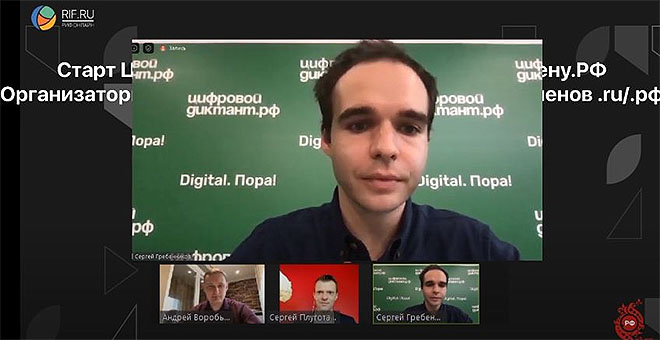On May 12, an online marathon to mark the 10th anniversary of .РФ ran for the entire day. The roundtable discussion Cyrillic on the Internet was one of the central events.
Leading internet experts discussed the history of delegating the Cyrillic domain to Russia, language and cultural diversity on the internet, the role of the Russian language in uniting the Russian-speaking community on the net and new opportunities for the development of Runet.
Deputy Chairman of the Security Council of the Russian Federation, Dmitry Medvedev, who served as President in 2008-2012, wrote on his VKontakte page how the .РФ domain came into being 10 years ago: “When we had the idea of creating a domain zone, we thought that the primary purpose of this initiative was to showcase the role of the Russian language and the Cyrillic alphabet in the world. However today it is much more than just a culture-promotion initiative. The .РФ domain is one of the key guarantees of Runet’s stable operation regardless of any crises or outside pressure. This is especially important at this point in time, when communications have largely migrated online, including business contacts, against the backdrop of the coronavirus pandemic. This domain zone deserves much credit for reinforcing Runet’s independence as well as enhancing its safety and reliability. We will continue to develop the forward movement of the world’s largest Cyrillic domain.”
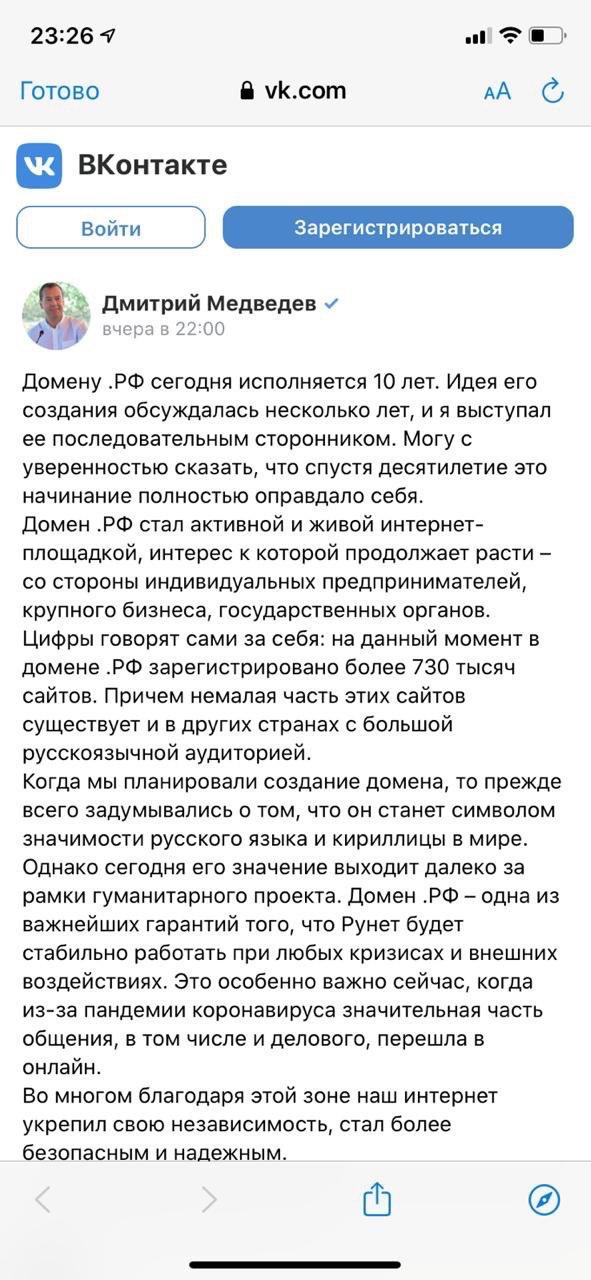
Presidential Plenipotentiary Envoy to the Central Federal District, Igor Shchegolev, who served as Russia’s Communications Minister in 2008-2012, sent his greetings to the participants in the roundtable event. He wrote: “Ten years ago, our country received the certificate for the .РФ TLD. From that moment on, anyone could register a domain in .РФ. So that this could be done, we had to go through lengthy international talks and do a lot of expert work. This was a major milestone, and unprecedented for Russia and the entire world-wide web. Today, the .РФ segment includes hundreds of thousands of domain names and has firmly established itself as the key Cyrillic TLD, reaffirming Russia’s status as one of the leading online powers.”
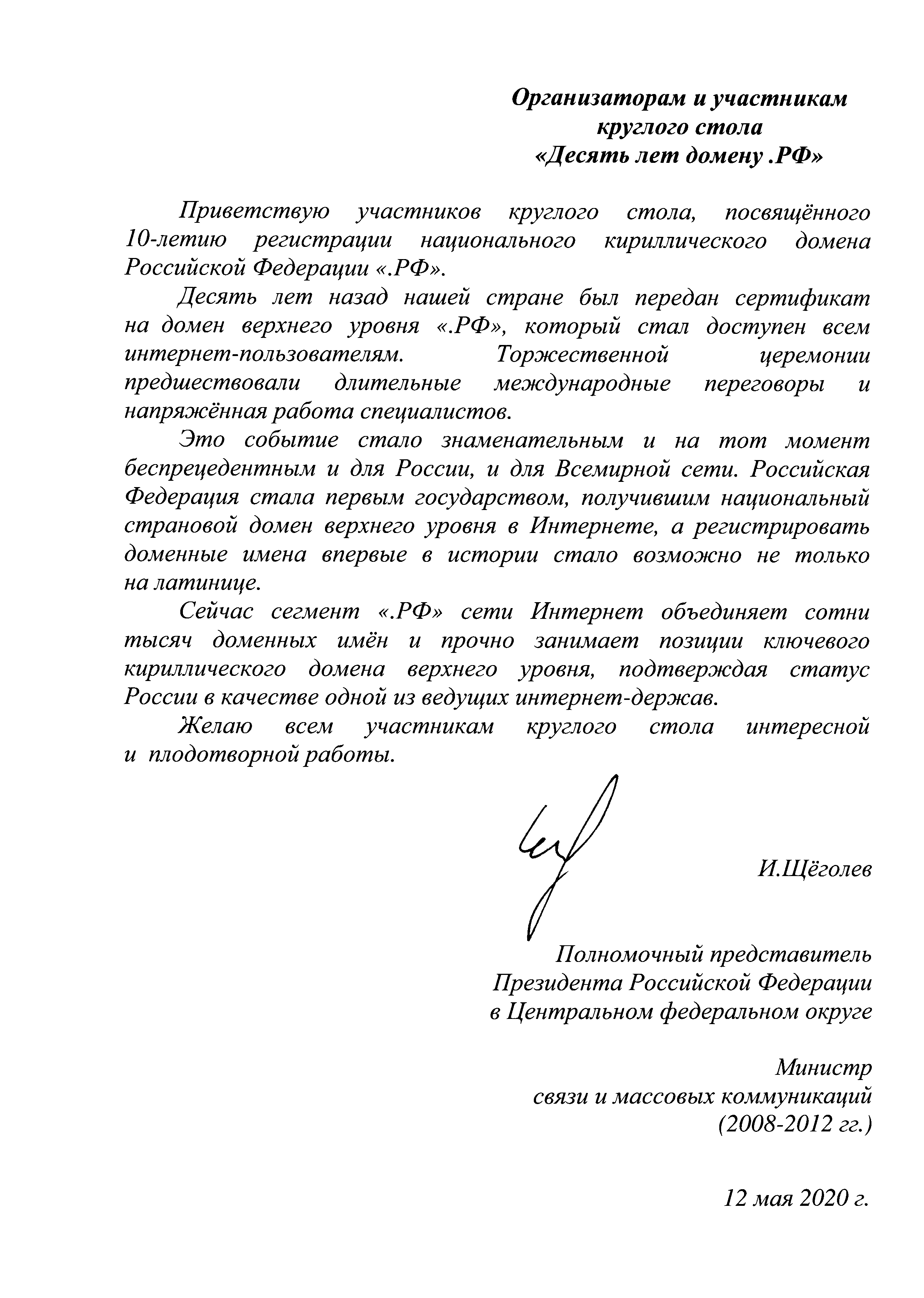
“The .РФ domain has not gathered as much momentum in its development as the .RU domain zone, but the 730,000 to 740,000 websites it operates are a serious achievement. Today, the growth projections for .РФ are quite optimistic, with more than 5,000 new domain names registered in .РФ in early May alone,” Head of the Federal Agency for Press and Mass Media Mikhail Seslavinsky pointed out. He went on to say that the .РФ domain included websites registered abroad. “There are 833 .РФ websites in the United States, 682 in Germany, 182 in Finland, 54 in Canada, 75 in Peru, 50 in Mexico, and 12 in Argentina. I would like to extend my deepest gratitude to all those who support the .РФ domain zone abroad,” Mikhail Seslavinsky noted.
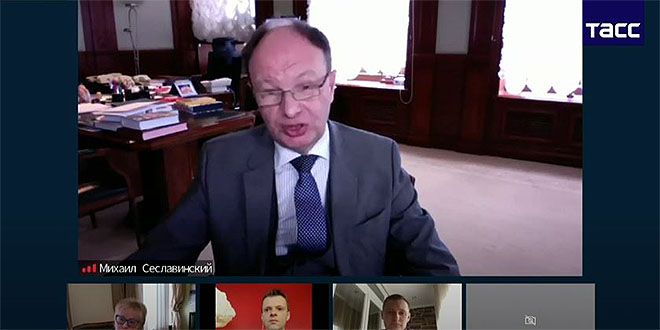
Director of the Coordination Center for TLD .RU/.РФ Andrey Vorobyev talked about .РФ development from the first time it was mentioned in 2007 to being officially delegated to Russia in 2010. He presented the stats of the registration and use of domain names in .РФ.
“Over the course of nine years, we saw that some of the domains registered during the feverish demand period were not renewed, but by the 10th anniversary the curve has flattened; there has been no decrease like eight years ago,” the Coordination Center director noted. He also talked about projects to mark the domain’s 10th anniversary: the 10.кц.рф website and the project to support domains and emails in national languages titled Поддерживаю.рф.
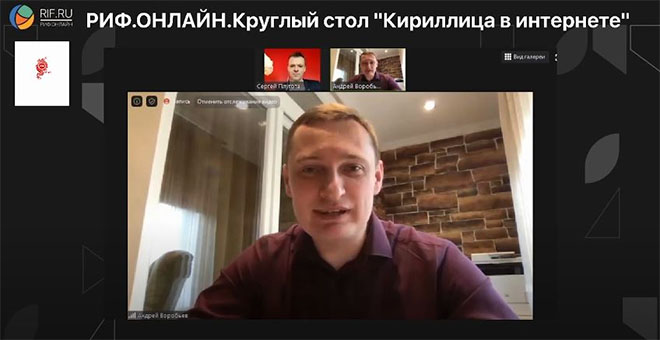
Andrei Kolesnikov (Internet of Things Association) and Mikhail Yakushev (Beeline) described how Russia’s request submission to ICANN to delegate a Cyrillic domain was received and fulfilled. Back in 2010, Andrei Kolesnikov was director of the Coordination Center and Mikhail Yakushev presided on the Coordination Center Board. They both were actively involved in the entire process of receiving the domain .РФ. “We started working with ICANN in 2008. We were developing Fast Track, a project to launch country-code domains. Many saw it as an alternative to the Russian internet that would prohibit everything else. The application submitted for .РФ was only two or three paragraphs. It was sent, and the domain was delegated. There was nothing extraordinary about it,” Andrei Kolesnikov said.
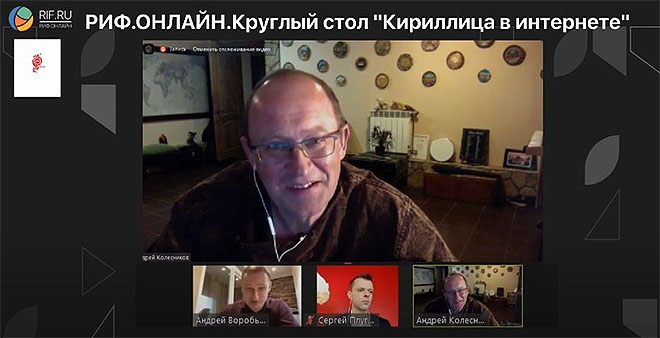
Mikhail Yakushev focused on the tasks that .РФ still had to solve. “Protection of Russian’s technological presence is still tenuous. Everything is still related exceptionally to the Latin alphabet. This issue must be addressed more systematically. Ten years have passed, and nothing has been done, so, unfortunately, we can see that the results are not what we need. Politically, we cannot use .РФ largely either,” said the reporter sharing his concerns.
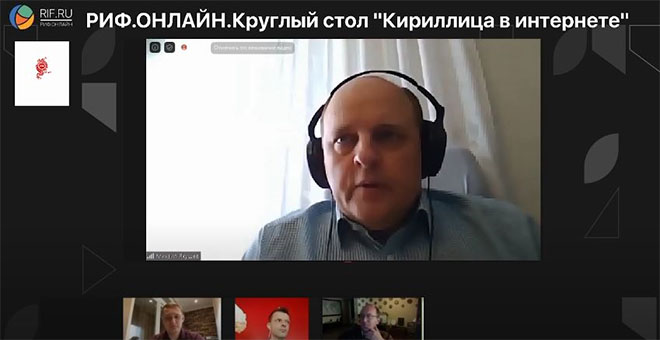
Universal Acceptance of IDNs and emails was also discussed by Mikhail Anisimov (ICANN), because it is one of the most topical issues on the non-English-speaking internet. Mikhail noted that all domain names must be served in the same manner, and that ICANN was working on technical solutions to allow the use of emails with ccTLDs.
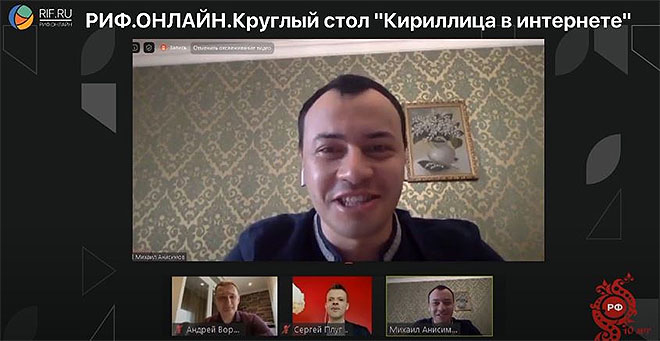
Interestingly, technology experts are not alone in their aspiration to expediting the adoption of universal acceptance. Even humanities-minded people talked about the need for this initiative to materialize. For example, Dmitry Kravchuk (stihi.ru and proza.ru) said that he founded the two domains back in 2000, and in 2009 was among the first registrants in the new .РФ domain with the same websites. However, he said that using the Cyrillic domain still remains a challenge: “The user generated content era started in 2000, when all the users who wrote literature, but never got a chance to publish it, all of a sudden could spread their works online. The Cyrillic domain meant progress to the whole mass of users, since many did not learn or practice English after leaving school. We registered .РФ domains back in 2009. Unfortunately, we cannot make full use of them even now considering the problems with universal acceptance we all know. I dream about Russians one day no longer needing to use English letters on their keyboards.”
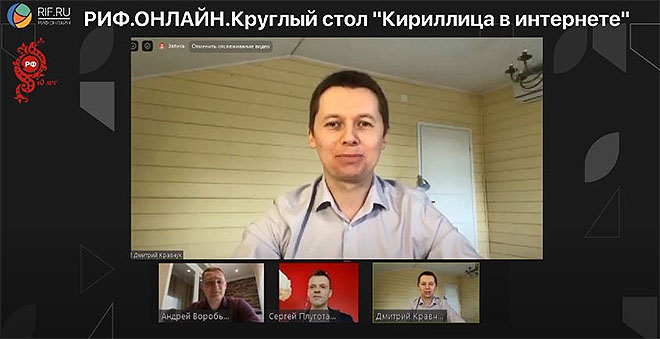
Pavel Lushnikov (National E-Library) discussed the practical use of .РФ domain names: “We use the .РФ domain, and I am managing the National E-Library’s project office at нэб.рф. However, we use it for redirecting users to rusneb.ru that has better indexing and optimization. The number of .РФ domain names increased over the past 10 years, which means that they are gaining in popularity and prominence. However, there is much that needs to be improved too. The purpose of our online library is to preserve our cultural and historical heritage as much as possible, make it accessible and promote the use of the Cyrillic alphabet in our country. Of course, using Cyrillic letters in domain names helps improve the accessibility of content for the people of our country, since not all of them know the English language.”
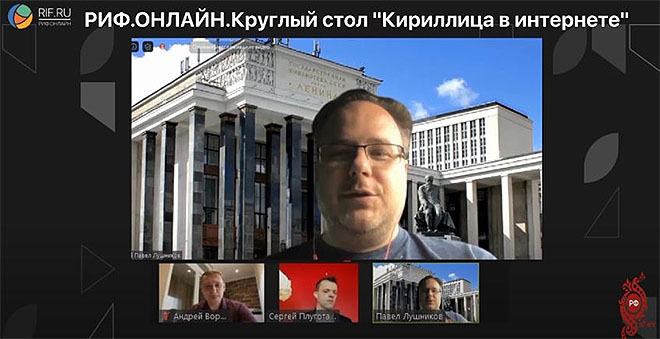
Despite technical difficulties, the participants in the roundtable discussion were unanimous in praising .РФ’s role in preserving language and cultural diversity in the network. The participants noted how important it was “to protect the Cyrillic alphabet” on the internet as well as to create new national and universal projects on the Russian-speaking internet. This would help to make .РФ a global and historical phenomenon and promote the Russian language as well as unite, preserve and develop the Russian-speaking community in the online world.
“The unique minority languages are important in the same way; even if a country has a state language it isn’t necessary to eliminate other languages; on the contrary, we should care about them, support and develop them. The same goes for IDNs, because they are part of a national culture and identity,” said Andrei Sebrant (Yandex).
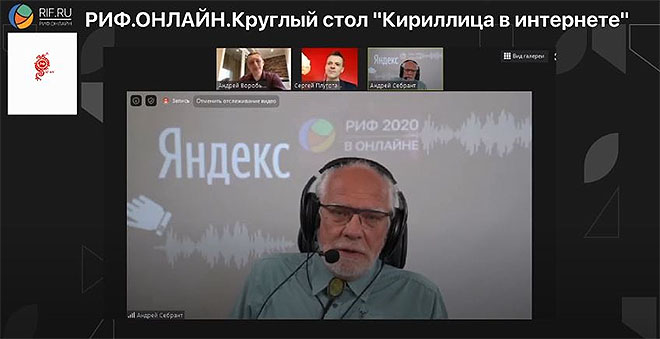
“In a globalized world, we must use orthography, promote the Cyrillic alphabet and do all we can to expand its global footprint. The state must insist that Cyrillic is used whenever and wherever possible,” Alexei Varlamov from the Gorky Literature Institute said.
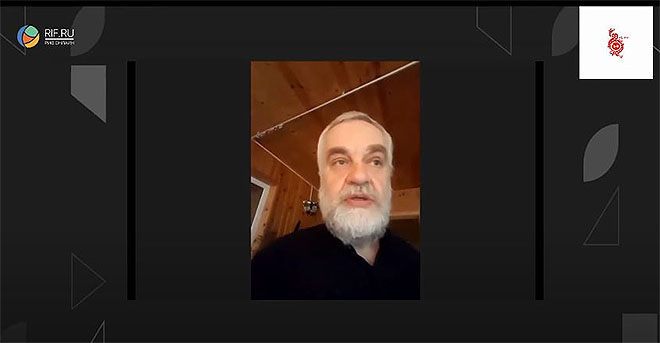
Ivan Zasursky (Faculty of Journalism, Moscow State University) said that the creation of Cyrillic domains was a real breakthrough. “But this does not necessarily mean that we can allow ourselves to be complacent. On the contrary we must continue to cultivate the new space with the same creative energy,” Zasursky pointed out. He also discussed online copyright issues, saying that they can be excessive at times. “We believe that apart from the © sign that stands for a copyright notice, we need to have an encircled “a” sign that would mean that authors have the right to share their content. Our internet must remain free, including from excessive copyright restrictions,” Zasursky went on to say.

The educational aspect of the Cyrillic domains was another important topic at the roundtable event. Alexander Ivanyuk (Documental Telecommunications Association, DTA) said the DTA was establishing a department to study information technologies using Russian hardware and software at Moscow Technical University of Communications and Informatics. “The department will be based on three pillars: teaching norms and regulations, technical training, and cultural and educational projects. We have already added a section on UA and IDN and we are preparing laboratory classes that will make the specifics easier to grasp,” Alexander Ivanyuk said.
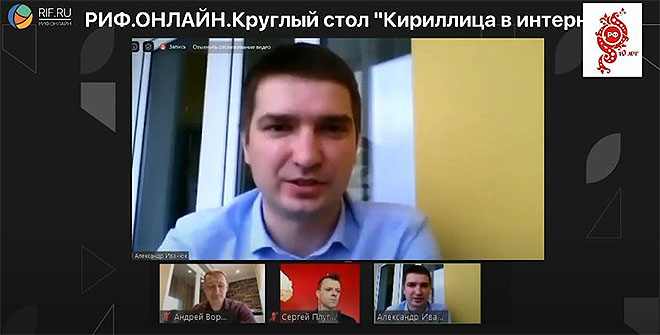
“The Cyrillic alphabet on the internet is not just a way to deliver digital content in Russian but also a way to preserve minority languages, which is important for our ethnically diverse country; moreover, don’t forget that Russian is a language of international communication and, most important, a language of multi-ethnic communication. We talk a lot about the place of the online space in culture, but we shouldn’t forget culture in the online space either. Recently, MSLU, DTA and the Coordination Center signed an agreement, and MSLU has created a new department, Information Culture in the Digital Economy, which can become a launch pad for joint research. The topic of language diversity on the internet is very topical in Europe, the CIS, and the Russian Federation,” said Irina Krayeva (MSLU).
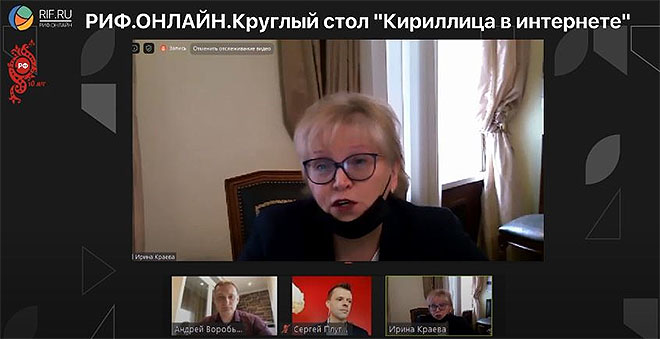
The roundtable discussion concluded with the launch of the nationwide Digital Dictation, 10 Years of .РФ: Internet in Russian, announced by Coordination Center Director Andrey Vorobyev, ROCIT Director Sergei Grebennikov and Director of Russian Association for Electronic Communications (RAEC) Sergei Plugotarenko.
Sergei Plugotarenko presented the Digital Dictation project and explained how it helps test digital literacy skills and competences among users: “This has been a very successful project, supported by industry players, as well as by the state. This year, over 330,000 people took part in the dictation. The platform has become so convenient and scalable that we decided to hold another dictation, this time on how people protect themselves from the coronavirus. The results were quite positive with about 50,000 people taking the dictation in a period of two weeks. This prompted us to organize yet another dictation in order to test the knowledge of users on the workings of the domain industry and how it relates to them.”
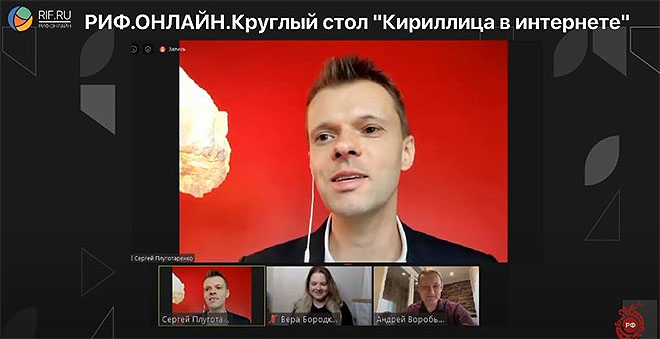
In his presentation, ROCIT Director Sergei Grebennikov discussed the importance of the Digital Dictation: “Held between March 28 and April 11, the National Digital Dictation included a series of domain-related questions. The results showed that users in Russia do not know much about the domain industry. After that the Coordination Center came forward with a proposal to hold another Digital Dictation on Russian-language domains, among other things, to mark the 10th anniversary of the .РФ domain. Starting today, users can find 13 questions at 10rf.digitaldictation.ru. Some may find them quite boring and technical, but they can help understand how the domain industry works, including the .РФ domain.”
